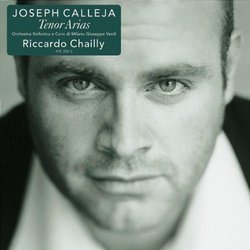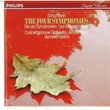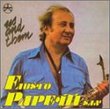| All Artists: Joseph Calleja, Riccardo Chailly, Giuseppe Verdi, Giacomo Puccini, Gaetano Donizetti Title: Joseph Calleja - Tenor Arias Members Wishing: 0 Total Copies: 0 Label: Decca Release Date: 5/11/2004 Genre: Classical Styles: Opera & Classical Vocal, Historical Periods, Modern, 20th, & 21st Century Number of Discs: 1 SwapaCD Credits: 1 UPC: 028947525028 |
Search - Joseph Calleja, Riccardo Chailly, Giuseppe Verdi :: Joseph Calleja - Tenor Arias
 | Joseph Calleja, Riccardo Chailly, Giuseppe Verdi Joseph Calleja - Tenor Arias Genre: Classical
This is the debut recital of Calleja, a 26-year-old Maltese tenor. His voice is as bright as a new penny, with a quick vibrato and a sweetness---plangent at times---which is very appealing. He sings favorites here but imbu... more » |
Larger Image |
CD DetailsSynopsis
Amazon.com This is the debut recital of Calleja, a 26-year-old Maltese tenor. His voice is as bright as a new penny, with a quick vibrato and a sweetness---plangent at times---which is very appealing. He sings favorites here but imbues each of them with a really individual stamp: Alfredo's Act II aria from Traviata has rarely sounded so urgently youthful (here, and throughout, the leadership of Riccardo Chailly is wonderfully sensitive and alert); Macduff's aria is filled with sadness and sung with a long, heartfelt line; "Questo e quella" has swagger and so does "La donna è mobile," but neither is marred by giggles or outbursts of any kind, and the latter's cadenza encompasses every note, clearly articulated. His high notes tend to be a bit wiry (a D flat at the end of "Possente amor" is a dud) but they're still exciting. Edgardo's big scene from the end of Lucia rarely works on CD; here Calleja gives us the desperation, the shock and the tragedy in a vivid portr! ayal. All through the recital he's musically and textually attentive; he's scrupulous about the composer's markings and has thought about each character's situation. This is a very impressive introduction to a fine young tenor, and the presentation, with chorus where required and second verses included, is equally good. Bravo! --Robert Levine Similarly Requested CDs
|
CD ReviewsA must have Diego Lima | VGB - Cba - AR | 10/29/2004 (5 out of 5 stars) "As I read David's comments I realized I strongly disagree with his views. I should explain one thing to those who think about Joseph's vibrato as a fault. His voice is healthily produced and his vibrato is one of the most correct ones, nowadays, a product of a proper balancing of registers (three registers according to Paul Asciak's line of teaching). Maybe it will settle down a little bit but the thing is that right now is healthy. There are two things to consider, a proper vibrato should vary between 5.5 - 7 pulses per second and then there is the oscillation rate which must not be too wide or it will spread. What you David describe as a "pronounced vibrato" or "quiver" is what I understand as a "tremolo" which is characterized by faster pulses than the average and a variation of the volume - only registered by machines. And it can be the result of too much breath pressure. This is not the case of Joseph's vibrato which is consistent through all his registers. The wobble, is a slower rate of pulses is what we are used to nowadays and THAT is, in my opinion, the reason that ears of todays listeners automatically asses a faster than TODAY's average vibrato as faulty. A voice freely produced wich reminds me of the tenors of the past, a correct vibrato, a beautiful timbre and a great legato. Calleja is THE tenor for the next years to come, no doubt. And this record is a "must have". Regards, Diego." A Beautiful and Distinctive Voice Howard M. Bushnell | Princeton, New Jersey | 11/20/2004 (5 out of 5 stars) "I was immediately struck by the sheer beauty of Calleja's tenor, which is given an additional frisson by the fast, shallow vibrato, just enough to make the sound "electric.". May he not lose it! To me the sheer sound of the voice, with its beautiful texture, sounds like a vocally superior Alfredo Kraus. If I were to be hypercritical, I might notice that to my ear the upper register could use a further bit of development, as the voice sometimes sounds a bit uncomfortable above the staff, but even to mention this overstates the case and I notice that no other reviewer has mentioned such a problem. This is one of the rare albums that one can put on permanent repeat and listen to all day long. I recommend it without reservation to all who delight in a beautiful and distinctive voice." A golden voice Howard M. Bushnell | 05/18/2004 (5 out of 5 stars) "Having watched the DVD of Donizetti's Maria Stuarda, where Joseph Calleja sang the part of Leicester, I was so struck with his performance that I immediately ordered this CD from Amazon UK. As Leicester he turns in a mellifluous performance, one which remains longer in the memory than those of the two powerful female protagonists, despite their histrionic skill and imposing stage presence. This CD more than confirms my first impression, that here we have a voice that echoes from an age that one thought had passed for ever. Although one is reminded of the younger Pavarotti here and there, the sheer elegance of his voice is also reminiscent of Gigli and Ferruccio Tagliavini, whom I am sure he has also studied.His fast vibrato may sound a little old fashioned on first hearing but he uses it to perfection in the Macbeth and Lucia arias, where it serves to communicate a profound sense of loss and inner grief, nor does it disturb the legato line, for instance in the superb "Quanto e Bella". He can also be extremely nimble, carelessly throwing off his phrases in " Questa o quella", as if to the manner born. Elsewhere one notices a rock steady middle register coupled with a seemingly effortless control of dynamics and skill in phrasing, so apparent when comparing Calleja with the young Domingo, from the "definitive" Kleiber Traviata, who sounds so laboured by comparison. And all this from a man of only 26, who actually sang Macduff at the tender age of 19 - unbelievable but true. One can only hope that he will provide us with more recordings over the coming months, perhaps drawing on the operas of Bellini (we certainly need a new Sonnambula), Massanet, and Mozart, where his voice truly belongs. There need be no fears, either, that he will squander his gifts by taking on the heavier roles that could so damage a voice such as his. He clearly operates within his capacity without stretching the limits, hence his one safe venture on this CD into Pinkerton, with the less taxing but deeply moving "Adio".The recording itself is blessed with a fine conductor in Chailly, who also provides him with a soprano, bass and chorus, the latter, though perhaps a little too bland in the Rigoletto excerpt, nevertheless providing a useful bridge to the Duke's "Possente amor" and its repeat, an item that is often unaccountably missed in the opera house and in recordings.Are there any disappointments here? Only one. We could have done with more than the 57 minutes, with perhaps fifteen minutes more from his repertoire - for instance his Leicester in Maria Stuarda.It has to be noted that Calleja is a native of Malta - a small Mediterranean island with a fine operatic tradition, amply evidenced at their music festivals and opera productions which I have attended over the years. He further enhances its reputation as a cradle for fine singers which have included his teacher Paul Asciak who sang regularly at Covent Garden; and then, from the same period, the tenor Oreste Kirkop who followed the same path to America until retiring through ill health. The soprano Miriam Gauci enjoys international fame. We also have the dramatic soprano Antoinette Miggiani from the 'sixties and her pupil Lydia Caruana, a soprano currently active throughout Italy and the rest of Europe. Not bad, eh? - from an island with a population of less than 400,000, equal to that of, say, a small English town.I recommend this recording unreservedly. Buy it."
|

 Track Listings (15) - Disc #1
Track Listings (15) - Disc #1




